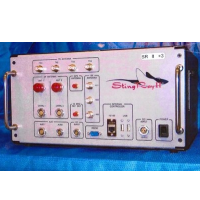Lawsuit Wants San Diego Police to Go Public about Stingray Surveillance
 Harris Corporation's StingRay (photo: U.S. Patent and Trademark Office)
Harris Corporation's StingRay (photo: U.S. Patent and Trademark Office)
The San Diego Police Department (SDPD) does not deny having and deploying Stingray technology that mimics cell towers and allows law enforcement to track people. Then again, they don’t admit it either. Mostly, officials don’t talk about it because they, and other departments in a similar situation, signed an agreement saying they wouldn’t.
Last week, the First Amendment Coalition filed a lawsuit (pdf) against the department and the city asking them to disclose any information they have about the possession and use of International Mobile Subscriber Identity Catchers (IMSI), better know in the trade as Stingrays.
The device has been around for years and has mostly been used domestically by the FBI. But the accelerated militarization of local police since 9/11 has contributed to the widespread use of the technology by local cops, raising serious questions about privacy and abuse of civil liberties. An estimated 40-50 law enforcement agencies use them.
Stingrays work by acting like cell towers. All cell phone calls in their area are captured by the device and then the signal sought by the authorities is isolated via its unique ISMI number. It works as long as the phone is on, but doesn’t have to be in use.
They can be used to effectively track the whereabouts of a person without planting a bug on them and the beauty of it is, the cops don’t use a warrant. The American Civil Liberties Union (ACLU) found a Florida police detective who landed permission to use a Stingray by filling out a routine “track and trace” application rather than seeking a more-difficult-to-obtain probable-cause warrant.
The Los Angeles Police Department (LAPD) picked up a Stingray back in 2006, according to LA Weekly, using U.S. Department of Homeland Security (DHS) funds, and used it 21 times during one four-month period. Cases included homicide investigations, three kidnappings, two attempted murders, two suicides, two missing persons, rape and narcotics.
Harris Corporation, the company that makes Stingrays, requires police departments to sign nondisclosure agreements that they are using the technology, making court oversight problematic. It also doesn't help that the Obama administration has been advising local authorities to obscure use of the surveillance, which they have done.
The government has argued for years that warrants aren’t needed since the device does not reveal the content of messages, and cellphone users have no expectation of privacy.
The lawsuit doesn’t confront that assertion. The attorneys just want to look at public records that show what the department owns, what training manuals are used, and what guideline and restrictions exist for Stingrays. They would also like six months worth of any legal motions or documents submitted to a judge for use of the devices.
The coalition filed a public records request for that information and received back from the department a single, heavily-redacted invoice for the Stingray purchase. So they sued.
“Does SDPD apply for search warrants to use the Stingray, and if so, does it give judges enough information?” Coalition Executive Director Peter Scheer asked in a release. “These are the kinds of things that the public has a right to know.”
–Ken Broder
To Learn More:
Why Cellular Tracking Device Is So Secret (by Lyndsay Winkley, U-T San Diego)
FAC Sues San Diego PD for Records on Controversial Cell Phone Surveillance Technology (by Peter Scheer, First Amendment Coalition)
U.S. Marshals Seize Cops’ Spying Records to Keep Them from the ACLU (by Kim Zetter, Wired)
Local Cops Throughout the State Use Anti-Terrorism Stingrays to Track Cellphone Users (by Ken Broder, AllGov California)
First Amendment Coalition v. San Diego Police Department City of San Diego (San Diego County Superior Court) (pdf)
- Top Stories
- Controversies
- Where is the Money Going?
- California and the Nation
- Appointments and Resignations
- Unusual News
- Latest News
- California Forbids U.S. Immigration Agents from Pretending to be Police
- California Lawmakers Urged to Strip “Self-Dealing” Tax Board of Its Duties
- Big Oil’s Grip on California
- Santa Cruz Police See Homeland Security Betrayal in Use of Gang Roundup as Cover for Immigration Raid
- Oil Companies Face Deadline to Stop Polluting California Groundwater





